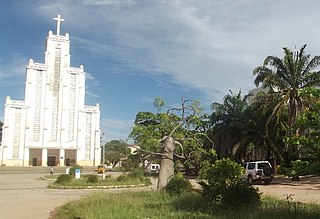Related Research Articles

The BBC World Service is an international broadcaster owned and operated by the BBC. It is the world's largest of any kind. It broadcasts radio news, speech and discussions in more than 40 languages to many parts of the world on analogue and digital shortwave platforms, internet streaming, podcasting, satellite, DAB, FM and MW relays. In 2015, The World Service reached an average of 210 million people a week. In November 2016, the BBC announced that it would start broadcasting in additional languages including Amharic and Igbo, in its biggest expansion since the 1940s.

Voice of America (VOA) is an American international broadcaster funded by the United States Congress. It is the largest and oldest U.S. funded international broadcaster. VOA produces digital, TV, and radio content in 47 languages which it distributes to affiliate stations around the globe. It is primarily viewed by foreign audiences, so VOA programming has an influence on public opinion abroad regarding the United States and its people.
International broadcasting, in a limited extent, began during World War I, when German and British stations broadcast press communiqués using Morse code. With the severing of Germany's undersea cables, the wireless telegraph station in Nauen was the country's sole means of long-distance communication.
There are two types of radio network currently in use around the world: the one-to-many broadcast network commonly used for public information and mass-media entertainment, and the two-way radio type used more commonly for public safety and public services such as police, fire, taxicabs, and delivery services. Cell phones are able to send and receive simultaneously by using two different frequencies at the same time. Many of the same components and much of the same basic technology applies to all three.
Radio Canada International (RCI) is the international broadcasting service of the Canadian Broadcasting Corporation (CBC). Prior to 1970, RCI was known as the CBC International Service. The broadcasting service was also previously referred to as the Voice of Canada, broadcasting on shortwave from powerful transmitters in Sackville, New Brunswick. "In its heyday", said Radio World magazine, "Radio Canada International was one of the world's most listened-to international shortwave broadcasters". However, as the result of an 80 percent budget cut, shortwave services were terminated in June 2012, and RCI became accessible exclusively via the Internet. It also reduced its services to five languages and ended production of its own news service.

Mahajanga[maːˈdzaŋɡə̥] is a city and an administrative district on the northwest coast of Madagascar.

Radio Moscow, also known as Radio Moscow World Service, was the official international broadcasting station of the Union of Soviet Socialist Republics until 1993. It was reorganized with a new name: Voice of Russia, which has also since been reorganized and renamed Radio Sputnik. At its peak, Radio Moscow broadcast in over 70 languages using transmitters in the Soviet Union, Eastern Europe, and Cuba.

The Voice of Prophecy, founded in 1929 by H.M.S. Richards, Sr., is a Seventh-day Adventist religious radio ministry headquartered in Loveland, Colorado. Initially airing in 1929 on a single radio station in Los Angeles the Voice of Prophecy has since grown to numerous stations throughout the United States and Canada. It was one of the first religious programs in the United States to broadcast nationally. Under the leadership of Shawn and Jean Boonstra, the ministry has now expanded into additional forms of media, including the weekly Disclosure broadcast and Discovery Mountain radio adventure series for kids. Additional projects include humanitarian efforts in countries such as India and Myanmar.

Shortwave listening, or SWLing, is the hobby of listening to shortwave radio broadcasts located on frequencies between 1700 kHz and 30 MHz. Listeners range from casual users seeking international news and entertainment programming, to hobbyists immersed in the technical aspects of radio reception and collecting official confirmations that document their reception of distant broadcasts (DXing). In some developing countries, shortwave listening enables remote communities to obtain regional programming traditionally provided by local medium wave AM broadcasters. In 2002, the number of households that were capable of shortwave listening was estimated to be in the hundreds of millions.
Shortwave broadcasting in the United States allows private ownership of commercial and non-commercial shortwave stations that are not relays of existing AM/MW or FM radio stations, as are common in Africa, Europe, Asia, Oceania except Australia and Latin America. In addition to private broadcasters, the United States also has government broadcasters and relay stations for international public broadcasters. Most privately owned shortwave stations have been religious broadcasters, either wholly owned and programmed by Roman Catholic and evangelical Protestant charities or offering brokered programming consisting primarily of religious broadcasters. To better reach other continents of the world, several stations are located in far-flung US territories. Shortwave stations in the USA are not permitted to operate exclusively for a domestic audience; they are subject to antenna and power requirements to reach an international audience.
HCJB, "The Voice of the Andes", was the first radio station with daily programming in Ecuador and the first Christian missionary radio station in the world. The station was founded in 1931 by Clarence W. Jones, Reuben Larson, and D. Stuart Clark. HCJB now focuses on Ecuador with unified programming on FM at 89.3 MHz in Pichincha, at 92.5 MHz in Manabí, at 96.1 MHz in Tungurahua and Cotopaxi, at 98.3 MHz in Esmeraldas and with separate programming on AM at 690 kHz. Broadcasts in Spanish and indigenous languages on 6050 kHz (1 kW), continue on an intermittent basis with a new solid state transmitter which in 2017 replaced an older (5 kW) transmitter. These broadcasts were not listed on the HCJB English website as of February 2016.
DXing is the hobby of receiving and identifying distant radio or television signals, or making two-way radio contact with distant stations in amateur radio, citizens' band radio or other two-way radio communications. Many DXers also attempt to obtain written verifications of reception or contact, sometimes referred to as "QSLs" or "veries". The name of the hobby comes from DX, telegraphic shorthand for "distance" or "distant".
The Bible Broadcasting Network (BBN) is a listener-supported global Christian radio network staffed and headquartered in Charlotte, North Carolina. It was founded in 1971 by Lowell Davey, who was the network's president until his death in 2017. As of 2021, Carl Redemann is executive director.
There are a number of media ministries associated with the Seventh-day Adventist Church. These come in print, radio and television forms and reach countries all around the globe. The Adventist church has a long history of media-based communication, having grown out of the Millerite movement of the 1840s which heavily used the print media. Some of the media ministries are directly funded by the church, while others are self-supporting organizations that rely on donations.

WAWZ is a contemporary Christian music radio station located in Zarephath, New Jersey. It is a listener supported/commercial radio station owned by the Pillar of Fire International. The station's target demographic is 25- to 54-year-olds. The Class B, 28,000-watt signal based in Bridgewater, New Jersey serves the New York City market along with northern and central New Jersey.

Radio France Internationale, usually referred to as RFI, is a French public radio service that broadcasts in Paris and all over the world. With 35.6 million listeners in 2008, it is one of the most listened to international radio stations in the world, along with BBC World Service, Voice of America and China Radio International.
WRNO is a commercial shortwave radio station which began international broadcasting on February 18, 1982 and continued regular broadcasting through the early 1990s from Metairie, Louisiana, with a continuation of periodic broadcasts starting in 2009. These call letters are still in use by the New Orleans station WRNO-FM; both were founded and originally owned by Joseph Costello III.

Radio Ukraine International, abbreviated RUI, is the official international broadcasting station of Ukraine. As a section of the National Radio Company of Ukraine (NRCU) and working from studios located in the heart of the capital city Kyiv, Radio Ukraine International is a team of more than 60 professionals that develop programming and news broadcasts in three languages. The mission of RUI is to acquaint foreign listeners with all diversity of political and social-economic life, current affairs, cultural history, spiritual life, and music of Ukraine. The broadcasts of RUI are also intended to help Ukrainians living abroad to remain informed and in touch with home. The Romanian language broadcasts are produced and transmitted from studio facilities located in Chernivtsi.

KNLS is an international shortwave radio station near Anchor Point, Alaska, United States. The station is operated by World Christian Broadcasting, a non-profit company based in the United States. KNLS broadcasts 20 hours a day of Christian-themed programming in Chinese, English and Russian.
World Christian Broadcasting is a non-profit Christian organization that operates international shortwave radio shortwave stations. The station's transmitters are in Alaska and the Indian Ocean, and all of its programs are produced at the company headquarters and broadcast operations center in Franklin, Tennessee, a suburb of Nashville.
References
- ↑ | Northsidecoc.org "Madagascar World Voice dedication" (July 14, 2016)
- ↑ | Mount Evelyn DX Report "African site draws close to start" (February 12, 2015)
- ↑ | Christian Chronicle "After a decade of perseverance, Madagascar World Voice debuts" (May 18, 2016)
- ↑ | Mount Evelyn DX Report "African site draws close to start" (February 12, 2015)
- ↑ | Christian Chronicle "After a decade of perseverance, Madagascar World Voice debuts" (May 18, 2016)
- ↑ : World Christian Broadcasting-MWV Frequency Schedule